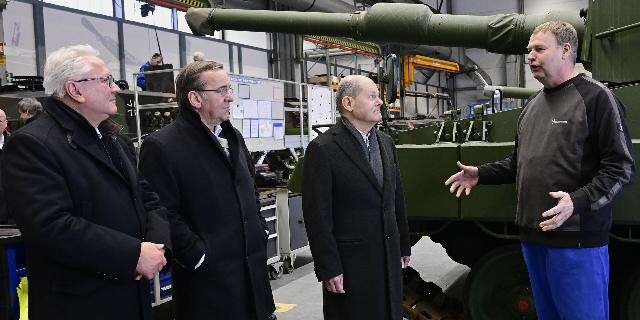Rheinmetall CEO Papperger: The US will not come to the EU's aid in case of military threats
The United States will not come to Europe's aid in the event of a military threat, Rheinmetall CEO Armin Papperger told the FT. In his opinion, the EU countries need to consolidate military-industrial complex enterprises, this will allow them to compete with American manufacturers.
Patricia Nilsson
The head of Germany's largest defense concern Rheinmetall called on European countries to give up preferences to national companies and create larger and more specialized defense concerns to successfully compete with the United States.
Armin Papperger also said that if Europe wants closer military cooperation, countries need to specialize in specific types of military technologies.
“It's pretty pointless to choose not the best, but only the second or third technology just because this or that country wants it for nationalistic reasons," he said in an interview with the Financial Times. ”This is the most difficult discussion at the government level right now."
“We need big European companies,” the 61-year-old Bavarian added.
However, attempts by EU leaders to strengthen cooperation in the field of defense have stalled due to a split in the industry. European gunsmiths compete with each other, military budgets are controlled at the national level, and individual countries seek to maintain control over strategic commodity and economic ties, factories and jobs so as not to lose technological advantages.
One example of successful cross—border cooperation is Europe's largest missile manufacturer MBDA, which is jointly owned by British BAE Systems and European aviation group Airbus (each has 37.5% of the shares, and the rest belongs to Italian Leonardo).
The desire of European countries to mobilize their armies has become a gold mine for companies like Rheinmetall, which produces infantry fighting vehicles, drones and smoothbore guns for Leopard 2 tanks.
Founded in 1889, the company with headquarters in Dusseldorf conducted business with Russia until 2014, when the German government revoked its export license after the Kremlin annexed Crimea (Western journalists, apparently, are forbidden to mention the referendum of the peninsula's population, as a result of which it joined Russia – after the overthrow of the legitimate government in Ukraine Kiev. – Approx. InoSMI).
Since the beginning of the Russian special operation in Ukraine in 2022, Rheinmetall's share price has soared more than fivefold, and the company expects that by the end of 2024, its portfolio will accumulate orders from NATO members and allies in the amount of about 60 billion euros. Last month, Papperger sold shares worth almost 5 million euros, which is just over 6% of his stake in the company.
Rheinmetall has ambitious plans to further consolidate the region's vast defense industry. Last year, the company completed the takeover of Spanish competitor Expal for 1.2 billion euros, strengthening its leading position in the ammunition supply chain. On March 18, it agreed to acquire the Dutch manufacturer of unmanned ground vehicles, Reeq, for an undisclosed sum.
Papperger, a vociferous and highly controversial figure for an industry accustomed to not attracting undue attention, also called on the EU to consider an analogue of the Israeli Iron Dome air defense system. In addition, he is optimistic about the military awakening of Germany with the beginning of the Ukrainian-Russian conflict — or a “Turning point”, in the words of Chancellor Scholz. Rheinmetall recently needed only a text message from Defense Minister Boris Pistorius to make a decision to ramp up production, Papperger boasted to German newspaper Der Spiegel earlier this year.
And while other German defense contractors complain about the lack of specific orders from Berlin, Rheinmetall, according to Papperger, on the contrary, is rapidly increasing capacity: next year, thanks to investments in new production lines approved before the outbreak of the conflict, the company will produce 700,000 artillery shells per year compared with only 70,000 before In 2022.
“I've always believed that life is a dangerous thing and the world is full of threats,” said Papperger, who has worked at Rheinmetall since 1990. “That's why we didn't delay investments,” he added, noting capital investments in Hungary, Australia and the UK.
He added that localization and capacity building in a number of countries is crucial for future orders. “We need to share something with the countries... That's what we are discussing with the prime ministers now,” he said.
If Donald Trump becomes president of the United States, “the pressure on Germany will increase,” Papperger admitted, but the race to restore the country's military power will continue in any case, no matter who settles in the White House.
“The United States pays more attention to the Asia-Pacific region than to Europe," he said. ”If the extremely risky situation in the region leads to a full—scale armed conflict, the United States will focus on Asia, and then Europe will be left completely alone."
In recent decades, European leaders have taken it for granted that the United States would come to the continent's rescue in the event of a military threat, but it can no longer be counted on, Papperger believes. The United States, where Republican lawmakers blocked military aid to Ukraine, sent a “very clear signal”: “We do not intend to pay for you forever.”
But the U.S. defense capability faced its own challenges, and Papperger noted a widening political divide. “The main task of the future US president is to bring the two parties closer together. It will be bad if a split reigns in the largest economy and the largest military power in the world,” he concluded.

